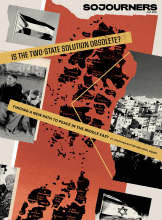Palestine
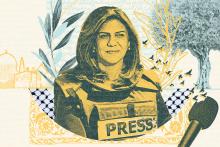
PALESTINIAN AMERICAN JOURNALIST Shireen Abu Akleh was shot and killed in May 2022 while covering an Israel Defense Forces raid on a refugee camp in the Palestinian West Bank village of Jenin. Abu Akleh had been standing with a group of other journalists and was wearing a blue vest with the word PRESS printed across it when she was shot; her producer was shot in the back but survived. Hours after Abu Akleh’s death, Israeli police went into her home, took away Palestinian flags, and prevented the singing of Palestinian nationalist songs.
In mid-November, the FBI opened an investigation into Abu Akleh’s death; Israeli Defense Minister Benny Gantz said Israel would refuse to cooperate since, Gantz said, the IDF had already investigated the IDF actions in the shooting. The U.S. State Department commented, “Not only was Shireen an American citizen, she was a fearless reporter whose journalism and pursuit of truth earned her the respect of audiences around the world.”
Before her death, households throughout the Arab world knew Abu Akleh’s work. Nicknamed “the daughter of Palestine” — and “the voice of Palestine” — Abu Akleh had worked for Qatar-based news outlet Al Jazeera for a quarter century. Viewed as courageous and thoughtful, Abu Akleh inspired many, including women interested in pursuing a career in journalism in the Middle East. A common signoff for her broadcasts summarized her motivation for being a journalist: “I chose journalism to be close to people. It might not be easy to change the reality, but at least I can bring their voices to the world. I am Shireen Abu Akleh.”
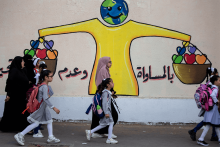
I was amazed at the grassroots leaders, mainly women, working to deliver that desperately needed good news to their communities. Their witness was particularly poignant given the patriarchal context in which they worked. Many of the government officials we met with were men who seemed focused on who would get what in the region’s future; the women we met were empowering people in their communities to create change.
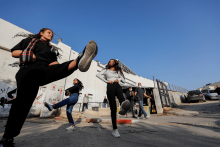
A giant Christmas tree takes pride of place in Bethlehem’s Manger Square, between the Church of the Nativity and a mosque adorned with lights cascading down its walls.
But there is more to the Palestinian city than its biblical significance, say organisers of the Bethlehem Cultural Festival, which promotes other aspects of the place revered as the traditional birthplace of Jesus.
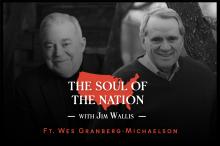
"Do we see the people that are involved at the most grassroots level?” he asks. “Do we get beyond all the politics and actually see the people?”
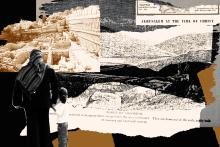
A short walk from the Temple Mount, in the East Jerusalem neighborhood of Al Bustan, there’s a plan to replace dozens of Palestinian homes with a new tourist destination: a lush garden on the site where some say King Solomon built his royal gardens and wrote the book of Ecclesiastes.
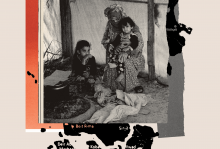
JONATHAN KUTTAB’S Is the Two-State Solution Obsolete? is an important, clear-eyed contribution to the conversation about the future of Israel-Palestine. Kuttab directly and with a forgiving spirit addresses what is at stake, making clear why thinking beyond the two-state solution paradigm is necessary for anyone who seeks a just and equitable path forward in the region.
As he writes, the “facts on the ground” are such that the geography of the two-state solution is untenable. He primarily discusses the emotional and social toll of uprooting the settlement enterprise, which is made up of more than 700,000 Jewish settlers living scattered across the West Bank. Israel has been building the infrastructure of a one-state reality for decades now, infrastructure that advances de facto annexation, suburbanizing settlements in the Jewish imagination, and fragmenting huge swaths of Palestinian territory. Jewish Jerusalem and its settlements, roadways, and municipal systems sprawl into the boundaries of Ramallah, Bethlehem, the Jordan Valley, and Palestinian East Jerusalem.
Currently, Israel is working on highway, housing, and water projects that are literally destroying and tunneling through mountains—and communities—in the landscape around Jerusalem and throughout the West Bank. This is not to mention the unending settler encroachment—in the past month alone, there have been four new settler outpost projects just in the South Hebron Hills. These steps are not easily undone, and with each construction project, Israel’s pseudo “two-state commitment” becomes more and more deeply embedded in an oppressive and unequal one-state reality.
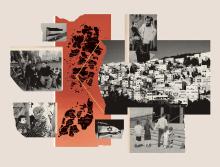
THE ISRAELI VICTORY in the 1967 war created a new reality in the region. Gradually, the outlines of a possible Grand Compromise began to take shape: Israel would return the land it captured in that war and in return the Palestinians and the Arab world would acknowledge Israel’s sovereignty over the 78 percent of Palestine that constituted the state of Israel on the eve of that war. This Grand Compromise, often referred to as “Land for Peace,” was enshrined in U.N. Resolution 242, and it gradually obtained the support of solid majorities among Palestinians and Arabs as well as Israelis and their supporters abroad. The two-state solution became the acknowledged goal for all well-meaning people as the ideal formula for a peaceful solution of the Arab-Israeli conflict. Those who rejected it from either side were viewed as maximalist hardliners and enemies to peace.
But as soon as the guns were silent in 1967, the issue of Jewish settlements in the newly occupied territories became a central and defining feature of the conflict between Zionism and Palestinian nationalism. International law allowed neither annexation nor the demographic shifts required to fulfill the Zionist ideal in terms of ejecting the non-Jewish population and moving Jews into the newly occupied territories. All such Zionist activity, therefore, needed to be carefully camouflaged and justified in secular, non-Zionist terms. It had to be justified either as a security measure, a temporary arrangement, or the creation of bargaining chips for the peace negotiations that were to come.
Palestinians who happened to be out of the area at the end of the war, or who left because of the war, were promptly blocked from returning. Israel started taking property all over the West Bank and Gaza under a variety of excuses and legal machinations and making that land available for Jewish settlers. Jewish settlers started moving in and creating exclusive Jewish enclaves that gave every indication of permanence. It is noteworthy that these settlements were not Israeli per se (Israeli Arab citizens were barred from them) but specifically and exclusively Jewish.
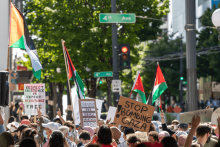
“As Black American activists are being increasingly heard and amplified, so is this message about linking national contexts and the importance of recognizing the global scope of anti-racism activism beyond national boundaries,” Roger Baumann said.

ONE OF THE most misleading words in the recent explosion of violence between Israel and Hamas is “conflict.” There is no symmetry or equivalence between desperate rocket attacks, deplorable as they are, from Hamas and the massive, disproportionate blitzkrieg by the region’s dominant military power. And, as usual, the casualties in such attacks were disproportionate as well: More than 20 times as many Palestinians, including many children, were killed, most of them predictable deaths from Israeli air force strikes on population centers in the Gaza Strip.
The bloodshed has sparked renewed calls for the “two-state solution”—the establishment of a Palestinian state alongside Israel. But, as Palestinian-American Jonathan Kuttab and American-Israeli Oriel Eisner explain in this issue, Israeli settlements have made the two-state approach impossible, and thus made clear the need for a shift in our thinking. As Kuttab writes, new thinking “would require each group to sufficiently empathize with and understand the hopes, fears, interests, and aspirations of the other group.” This spring’s violence makes painfully evident why such new thinking is urgently needed.

Historically, people love to opine on power. Whether it’s John Dalberg-Acton’s “Power tends to corrupt, and absolute power corrupts absolutely,” or Kanye West’s “No one man should have all that power,” the concept of concentrated power is taught as something to fear.
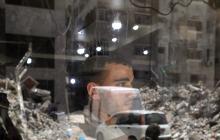
The images of civilian deaths and escalating violence in Israel and Palestine are heartbreaking. As this moral, political, and humanitarian catastrophe continues, we must urge our elected leaders to call for an immediate cessation of the current wave of violence, while also building the political will to interrogate the root causes of the crisis.
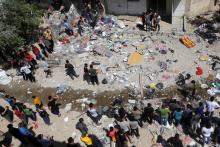
“Pray for the peace of Jerusalem!”
Palestine and Israel are back in the news. So again, we Palestinians hear this common refrain. But such calls are no longer enough. I say this as a pastor who believes in prayer, leads prayer services for peace, and genuinely values your good intentions.
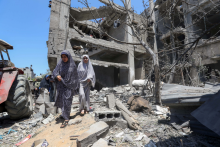
By May 14, reports indicated that at least 122 Palestinians, including 31 minors, had been killed and more than 900 wounded since May 10. In Israel, at least seven people were killed, including one child. While the immediate violence must be brought to an end, the realities of the ongoing Israeli occupation of Palestine cannot be ignored.
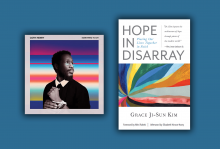
Future Soul
Virtuoso keyboardist Cory Henry’s 2020 album Something to Say encapsulates a trying year—traversing elation and sorrow. He brings Herbie Hancock-worthy skill and range to what he calls “future soul.” Featuring the Funk Apostles on four tracks, this self-produced project is required listening. Henry House Entertainment.
A Divine Puzzle
Author and public theologian Grace Ji-Sun Kim’s essays read as meditations in her newest book, Hope in Disarray: Piecing Our Lives Together in Faith. Sifting through today’s complex array of personal and societal injustices, Kim approaches readers with the gift of generative hope. The Pilgrim Press.

THE TRUMP administration was an utter catastrophe for those who care about justice and peace in Israel/Palestine. U.S. policy was entrusted to right-wing settlement supporters such as Ambassador David Friedman and Jared Kushner and Christian Zionists such as Secretary of State Mike Pompeo.
The administration applauded—and legalized—settlement expansion, showing utter disdain for international law. They displayed blatant antagonism to Palestinians by moving the U.S. embassy to Jerusalem, cutting off financial aid to Palestinian hospitals and the U.N. Relief and Works Agency for Palestine Refugees, and closing the Palestinian Liberation Organization office in Washington. They capped it all by promoting fake “peace” alternatives, such as Trump’s disastrous “Peace to Prosperity” plan and the normalization agreements with Gulf countries. These policies aimed to appease the most hard-right policies of Israel and the eschatological fantasies of evangelical Christian Zionists, rather than seeking genuine peace or justice.
The Biden administration is likely to reverse some of these extreme steps. Biden has already signaled, however, that he would not reverse the embassy move, nor support any measures for conditioning aid to Israel based on its behavior. Biden’s policy will likely be marked by a return to the traditional policies of the Obama era, which included anemic objections to renewed settlement expansion, verbal support for a two-state solution, and vague references to international law, while resisting any pressure on Israel to actually comply with international law or create a sovereign Palestinian state.
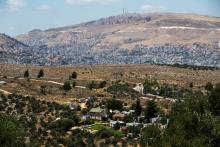
The government of Israel could soon begin formally annexing a significant portion of the West Bank. As the leader of an ecumenical and nonpartisan organization focused on advocating for a just and lasting end to the conflict in Israel-Palestine, I am deeply worried annexation will entrench inequalities and abuses of Palestinian human rights.

As a Palestinian Christian who grew up in Jerusalem, I have a hard time knowing where, if anywhere, my narrative fits among the pictures evangelical Christians paint of Israel. I was reminded of this recently when an acquaintance of mine did a “holy land tour,” and posted travel updates that showed up on my social media stream.
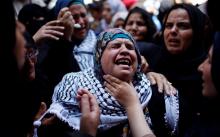
Violence in the Gaza Strip has been raging for more than two months, with more than 115 casualties in the "Great March of Return" protests organized by Hamas, a militant group that controls Gaza. Since the end of March, Palestinians have been protesting to shed light on on the Israeli-Egyptian blockade on Gaza, and also call for the “right of return” for Palestinian refugees displaced since the 1948 war.
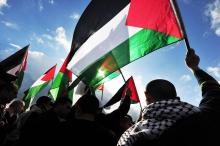
Strikingly, these Evangelical leaders made no public statements about what was right in front of them. They offered no words about the inhumane conditions their Palestinian brothers and sisters endure. They made no attempt to heal the fighting or bring justice to the situation.
